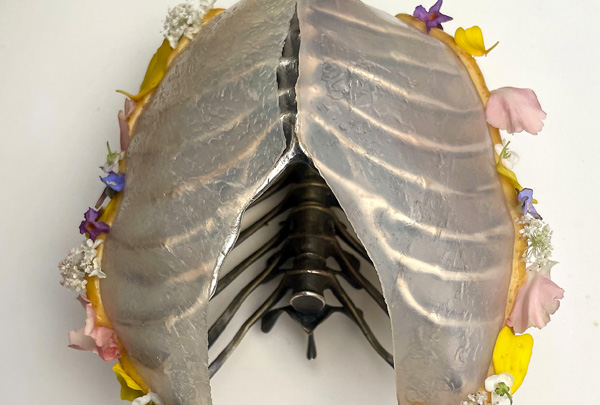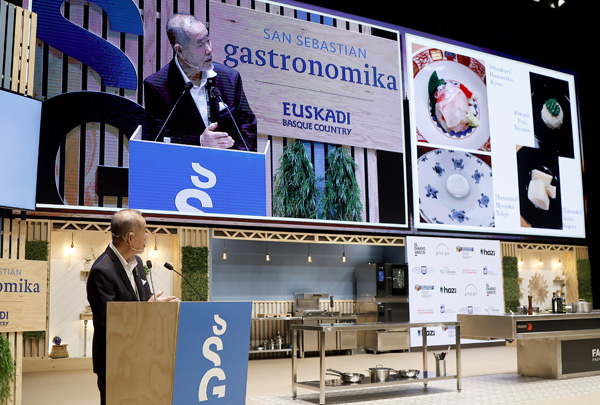News
The history of cuisine conspires in Gastronomika to outline the future of gastronomy
.jpg)
The first day of the 25th anniversary edition of the San Sebastian Gastronomika - Euskadi Basque Country has been full of history and emotion but also of future. The doyen of gastronomy congresses has demonstrated that shared experience and knowledge throughout these 25 years have set a solid foundation for building the cuisine of the future. And witness to this in the Kursaal has been the generation of chefs who changed the history of cuisine.
Some of the chefs who walked onto the stage seized the opportunity to take stock of their careers, such as the case of Disfrutar, Rodrigo de la Calle, Josean Alija or the very René Redzepi. Albeit the latter, with the excitement of a new project which Noma will develop into, he has also been one of the first to talk about the evolution and change towards a future equal to or more exciting than the gastronomic revolution lived through in recent years. A revolution led to a large extent by Ferran Adrià, who despite receiving the congress Tribute Award did not want to personalise it, since he considers that “it is a tribute no to one person, but to a generation”. Thanking the congress, he also remembered Juli Soler, who was his right-hand in elBulli, and an essential part of the success of the concept. Full of illusion, he does not give in to continue surprising us with new projects, after getting elBulliFoundation underway, linked this time to the Madrid Culinary Campus (MACC), of which it forms part.
As pointed out by Benjamín Lana, general manager of Vocento Gastronomía, in the inauguration of the congress, Gastronomika was “the meeting point for the transformation of gastronomy in Spain”, a role it wants to continue carrying out in the future” with a format where there is room for everyone and with a rich as well as complicated future. We will work with those we have always worked with and with new people, in order to keep Donostia as the capital of world gastronomy, as the city of gastronomic prodigies.” A promise which took on greater significance after Roser Torras, director of the congress, announced her decision to “step to one side, although I will never leave the grand family of cuisine” and cease to be -after 15 years at the helm- the figurehead of Gastronomika to pass the baton to Lana. An ovation and emotion from the entire auditorium followed this disclosure which only means a continuation in the history of Gastronomika.
The day, fraught with surprises, recognitions and emotion, was also attended by the founder of the congress -back then it was called Lo Mejor de la Gastronomía-, Rafael García Santos. One of the sharpest critics of Spanish gastronomy, who received the Pau Albornà I Torras award encouraging the new generations: “to risk, compete, this is what sets winners aside, you have to overcome these old fellows who made a revolution, but we, are not here anymore to talk about the future”. Completing the list of award winners, the Golden Gueridon was awarded to Jancis Robinson, quite possibly the most influential woman in the wine world, and the tribute received by the Arbelaitz brothers for their memorable career with Zuberoa, which closed its doors some months ago.
Great presentations
Special -such as this 25th edition-, was the three-voice presentation led by chefs Quique Dacosta (Quique Dacosta***) and Joan Roca (El Celler de Can Roca***), together with Benjamín Lana who staged some of the chapters of ‘The Red Prawn’ (Planeta Gastro), an extensive guide signed by the three speakers, providing an in-depth study of this great gastronomic icon of the Mediterranean from every perspective, gastronomic, scientific and economic.
Albert Adrià’s presentation as well, who his brother Ferran recognises as “the best chef I’ve ever known”. Albert knows quite clearly that cooking is his passion, which he describes as his obsession for the quality and seasonality of the product, and for an endless creative freedom. “I don’t want to tell a story nor do I want to create a philosophy; I’m looking for a style which has not yet arrived, and meanwhile I enjoy cooking again”, he recognises. He claims to not have a creative system, but operates by using the theory of ideas, the moment, of starting from scratch. “My creative system is a cloud, that mutates, it comes together with other clouds or disappears after a storm”, he explained. He does recognise that he is interested in essentiality, not distorting his view to what shouldn’t be, and prioritises the essential over the unusual, above all “when the explanation of a dish leaves no doubt. Emotion should be achieved through the essentiality of the flavour, for which we should decipher its DNA” he explained in Catalan.
But not only the younger of the Adrià philosophized (although he didn’t recognise it), adding to it all was Eneko Atxa (Azurmendi***) who explained the project which fuses his three-star Michelin restaurant with its surrounding environment. Eneko Atxa Eneko Atxa outlined that “I am obsessed by moments. The harvest, the things that happen before we work in the restaurant” and, through his preparations, he tries to show all of this despite “these moments at times are difficult to bring onto the table”.
Many successful careers in 25 years
On the occasion of the congress’s 25 years René Redzepi (Noma***), Josean Alija (Nerua*), the boys from Disfrutar**, Rodrigo de la Calle (El Invernadero*) took stock of their careers in their respective presentations. In the case of the Danish chef, introduced with emotion by Andoni Aduriz, he explained how he went from being a 15 year-old teenager “with no aspirations” to create the success of Noma and then go and turn it into something different, since he confirms “we are not going to close, we’re building a new Noma. I now know that to keep being who you are, you have to change. And this has been a constant in the last 20 years, in the restaurant and in my life”. The future project will, surely, bring more surprises.
For his part, Josean Alija, who opened the congress, has analysed his evolution over the burners and the influence a congress such as Gastronomika has had in his career, given that with it and the revolution it caused “my DNA as a chef started to take shape”. Alija has underlined that this type of congress enables “to share our knowledge, which is a chef’s greatest privilege”.
The green revolution of Rodrigo de la Calle has reached, just like Gastronomika, 25 years of age and the chef explained how he keeps exploring new techniques with which to continue “empowering the flavour of vegetables”. De la Calle has experimented with salt cooking, fermentation, grill, etc. and has decided that he will not cease to experiment “I will keep giving my all to what is green”.
Not two and a half decades, but 10, have been the years of techniques and concepts upon which Oriol Castro and Eduard Xatruch (Disfrutar**), have reflected. Reflection also provided by Paco Morales (Noor*) who recognised that in his restaurant “we don’t focus on the dish, but to the overall experience. The experience of the diner interests us more and it is not only the food. And for this reason, reflecting is essential for us. This season we have struggled specially, because we have changed all the dishes and for the proposal to be tasteful it needs a lot of fine tuning”, the chef recognised.
In addition to the above, other renowned chefs have appeared on the stage at the Kursaal on the first day of the anniversary edition of Gastronomika. Such is the case of Artur Martínez (Aurt*), who considers “the interaction with the diner” to be the main ingredient of his cuisine, and Diego Guerrero (Dstage**) who came here with the aim to surprise us and no doubt achieved it with his work on enzymes, “those chemical reactions our body generates when we eat” and his intention is to learn everything about it because “understanding how they work is understanding the chemistry of life”.


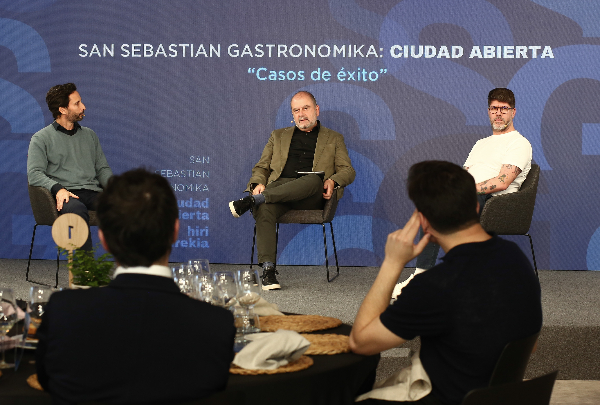
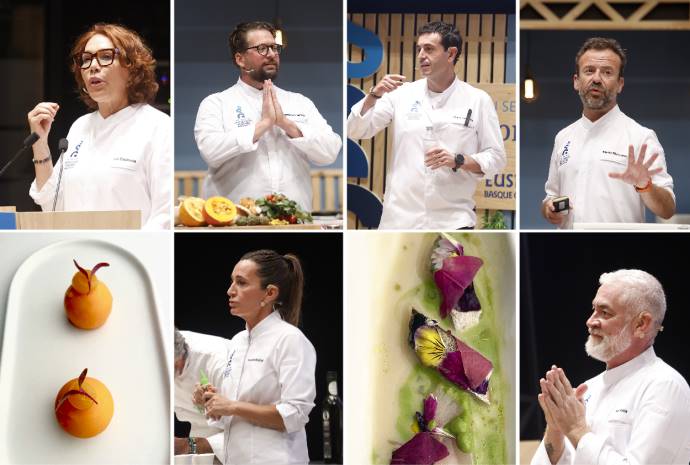
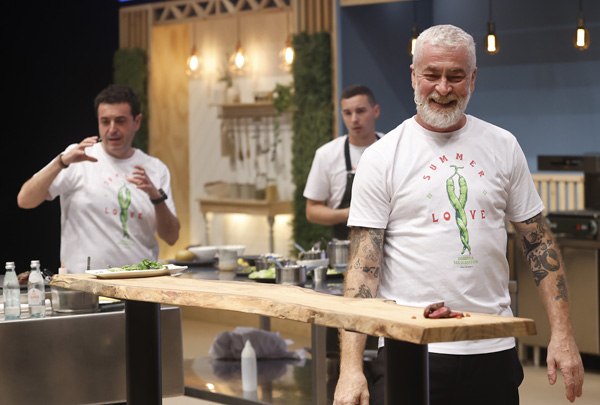
.jpg)
.jpg)
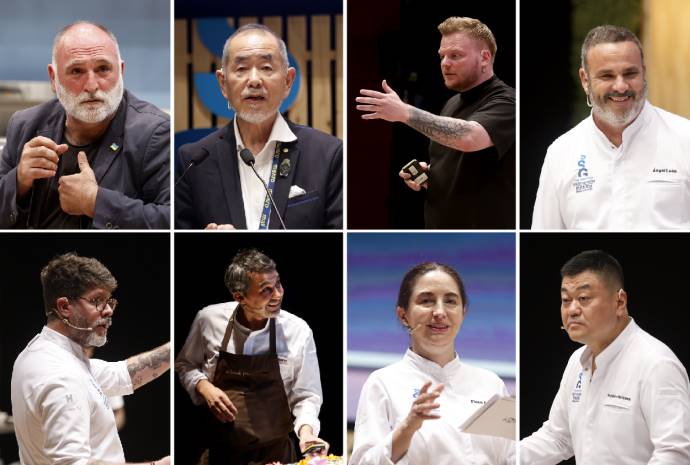
.jpg)
.jpg)
